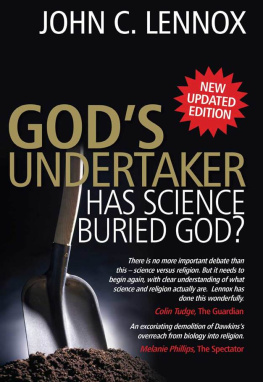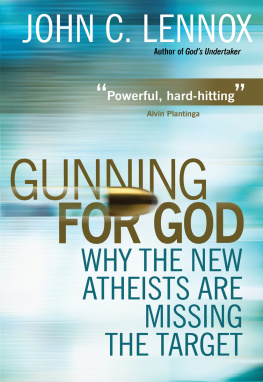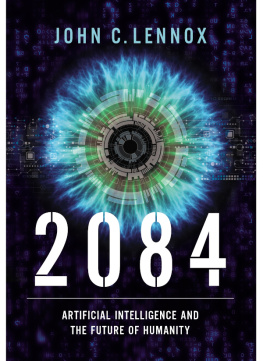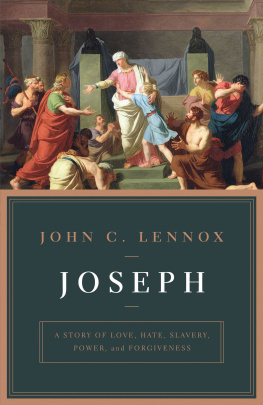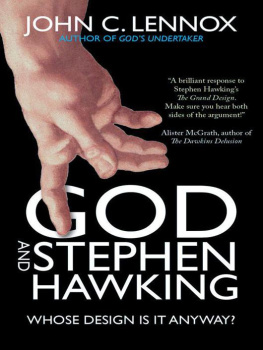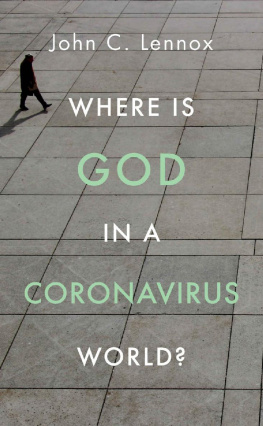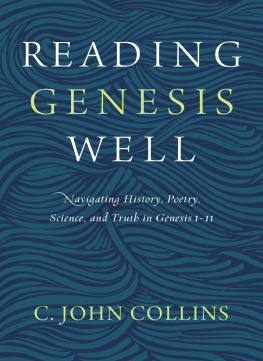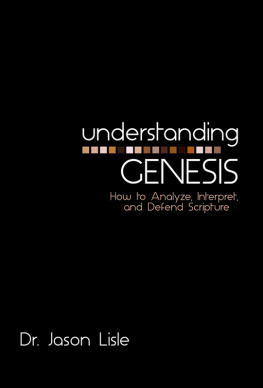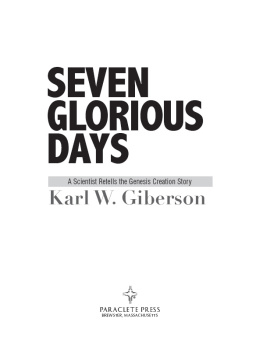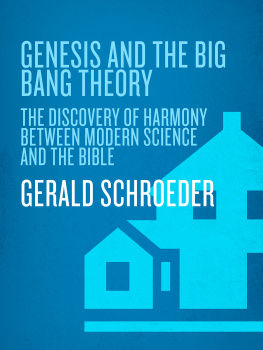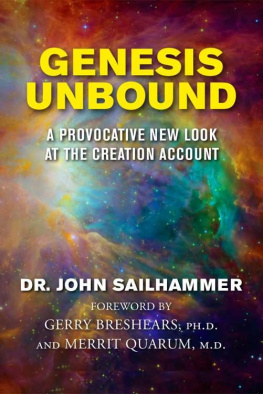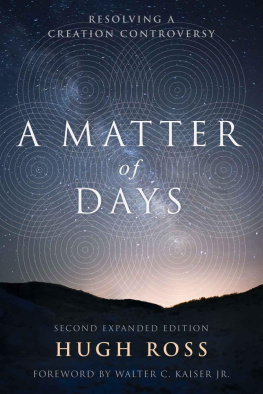For Larry Taunton, whose idea it was
This book is a delight to read: It is thoughtful, perceptive, friendly, and bold when it needs to be. Dr. Lennox has gone right to the heart of the matter in his thinking about Genesis and the age of the earth, and how that is a different question from purposeless evolution. In this well-written book, which shows good learning accessibly presented, Dr. Lennox has helped us to think clearly about these questions. I look forward to sharing this book with many people. Thank you, Dr. Lennox!
C. John Collins, Professor of Old Testament,
Covenant Theological Seminary
This remarkable book by John Lennox is exactly what Ive been looking to recommend! Its treatment of Genesis 1 and 2 in connection with modern science and ancient Near Eastern culture is accessible, wide-ranging, balanced, and irenic. Lennox has written a wise, well-informed work, and it deserves the widest readership possible.
Paul Copan, Professor and Pledger Family Chair
of Philosophy and Ethics, Palm Beach Atlantic
University, West Palm Beach, Florida
Dr. Lennox is an apt guide for exploring both the Bible and science. He admirably argues that they both reveal the same Creator and Designer. In this careful and well-documented study, he examines all the pertinent issues concerning the meaning of the Genesis creation account. Every careful reader will come away more knowledgeable, wiser, and better able to defend the truth of the Bible before a skeptical world.
Doug Groothuis, Professor of Philosophy, Denver
Seminary, and author of Christian Apologetics
Seven Days that Divide the World will certainly be controversial, but it is worthy of a careful reading by those interested in the ongoing science/religion discussion.
Dr. Henry F. Schaefer III, Graham Perdue Professor
of Chemistry, Director of Center for Computational
Quantum Chemistry, University of Georgia
In John Lennoxs inimitable manner, he addresses a passionate controversy with charity, humor, and humility. He examines rigorous academic arguments yet distills the scientific and biblical material in readable, interesting prose. I have learned much from my colleague Professor Lennox about engaging the toughest critics with grace and directness, and I am confident that readers will find his work equally engaging. I enthusiastically endorse this unique and insightful book.
Ravi Zacharias, author and speaker
CONTENTS
BEGINNING AT THE BEGINNING
In the beginning, God created the heavens and the earth. These majestic words introduce the most translated, most printed, and most read book in history. I well remember how profoundly they affected me on Christmas Eve 1968, when, as a student at Cambridge University, I heard them read to the watching world on live television by the crew of Apollo 8 as they orbited the moon. The context was a triumphant achievement of science and technology that caught the imagination of the millions of people who watched it. To celebrate that success the astronauts chose to read a text that needed no added explanation or qualification, even though it was written millennia ago. The biblical announcement of the fact of creation was as timelessly clear as it was magnificently appropriate.
However, as distinct from the fact of creation, when it comes to the timing and means of creation, particularly the interpretation of the famous sequence of days with which the book begins, people over the centuries have found the book of Genesis less easy to understand. Indeed, controversy about this matter is at an all-time high, with the debate about teaching creationism and evolution in schools in the USA, the question of faith schools in the UK, and, perhaps most of all, the popular perception of Christianity as unscientific (or even antiscientific) because of the Genesis accounta perception that is vocally endorsed by the New Atheists.
I once met a brilliant professor of literature from a famous university in a country where it was not easy to discuss the Bible publicly. She was intrigued to learn that I was a scientist who believed the Bible, and she said that she would like to ask me a question she had always wanted to ask but never dared to. She also said, with typically Eastern sensitivity, that she was reluctant to ask me the question in case it offended me: We were taught at school that the Bible starts with a very silly, unscientific story of how the world was made in seven days. What do you have to say about it as a scientist?
This book is written for people like her, who have been putting off even considering the Christian faith for this kind of reason. It is also written for the many convinced Christians who are disturbed not only by the controversy but also by the fact that even those who take the Bible seriously do not agree on the interpretation of the creation account. Some think that the only faithful interpretation of Scripture is the young-earth, literal view of the Genesis days that was made famous by Archbishop Ussher (15811656) of the city of Armagh in Northern Irelandwhere, incidentally, I lived for the first eighteen years of my life. Ussher gave 4004 BC as the date for the origin of the earth. His calculation, based on taking the days of Genesis 1 as twenty-four-hour days of one earth week at the beginning of the universe, is six orders of magnitude away from the current scientific estimate of around four billion years.
Others hold that the text can be understood in concord with contemporary science. Such old-earth creationists are again split over he validity of Darwins theory of evolution as
ORGANISATION OF THE BOOK
This book has five chapters and five appendices. As an introduction to controversy and how we handle it, the first chapter discusses the challenge which the scientific theory that the earth was moving in space posed to generally accepted biblical interpretation in the sixteenth-century. The second chapter moves on to some principles of biblical interpretation and applies them to that controversy. The third is the heart of the book, where we consider the interpretation of the Genesis days. The fourth is given over to the biblical account of the origin of human beings, their antiquity, and related theological questions about death. Finally, in the fifth chapter we balance our discussion of the creation week by drawing on the New Testament in order to learn what aspects of the Genesis 1 creation narrative are emphasized there, and why they are relevant for us today.
The appendices deal with several issues that, though important, are placed at the end of the book so that the reader can engage with the main biblical material without many digressions. Appendix A looks at the background of Genesis, in terms of culture and literature. Appendix B is devoted to what is called the cosmic temple view of Genesis 1. Appendix C describes the convergence of Genesis and science over the fact that space-time had a beginning. Appendix D considers the question of whether there is conflict between Genesis 1 and Genesis 2. Finally, appendix E considers theistic evolution, with special attention paid to the so-called God-of-the-gaps arguments.
I would like to emphasise that this little book does not pretend to be exhaustive in its scope. It has been written in response to frequent requests over the years. In order to keep the book short, I have had to prioritise those issues about which I have been most often questioned. Many other interesting questions have had to be omitted.


